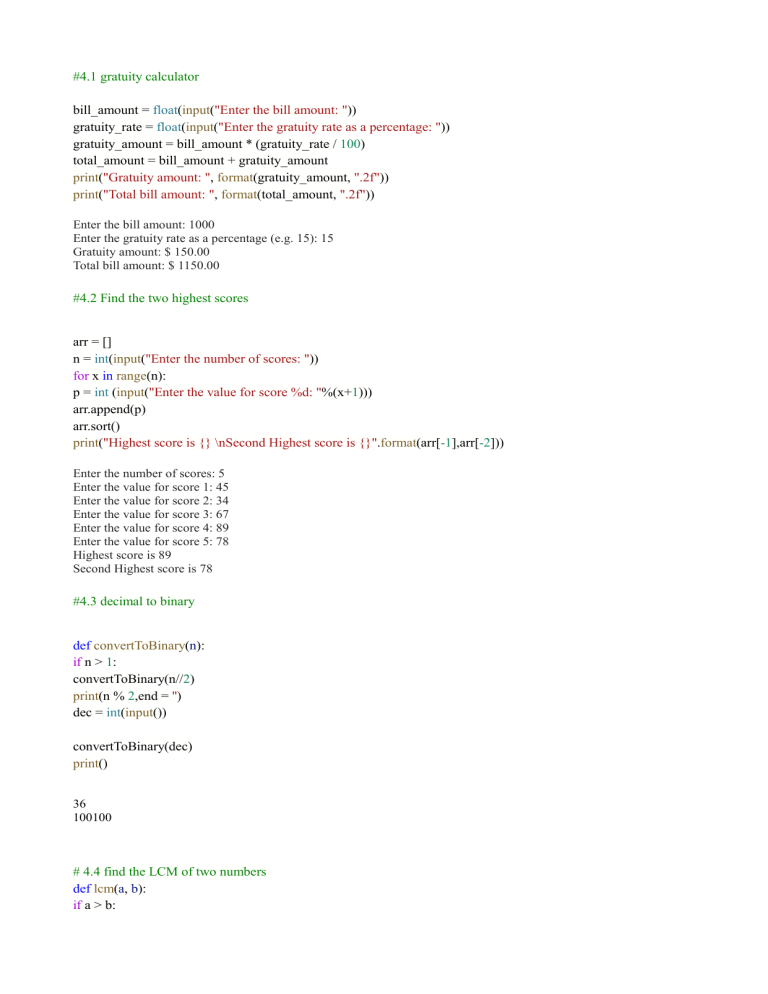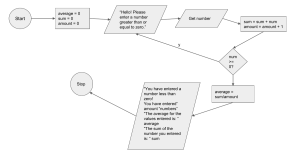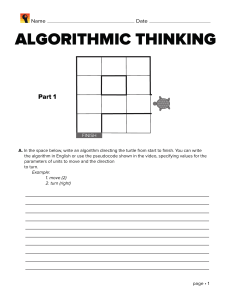Uploaded by
AKASH V (RA2111003040108)
Python Code Examples: Math, Logic, and Turtle Graphics
advertisement

#4.1 gratuity calculator
bill_amount = float(input("Enter the bill amount: "))
gratuity_rate = float(input("Enter the gratuity rate as a percentage: "))
gratuity_amount = bill_amount * (gratuity_rate / 100)
total_amount = bill_amount + gratuity_amount
print("Gratuity amount: ", format(gratuity_amount, ".2f"))
print("Total bill amount: ", format(total_amount, ".2f"))
Enter the bill amount: 1000
Enter the gratuity rate as a percentage (e.g. 15): 15
Gratuity amount: $ 150.00
Total bill amount: $ 1150.00
#4.2 Find the two highest scores
arr = []
n = int(input("Enter the number of scores: "))
for x in range(n):
p = int (input("Enter the value for score %d: "%(x+1)))
arr.append(p)
arr.sort()
print("Highest score is {} \nSecond Highest score is {}".format(arr[-1],arr[-2]))
Enter the number of scores: 5
Enter the value for score 1: 45
Enter the value for score 2: 34
Enter the value for score 3: 67
Enter the value for score 4: 89
Enter the value for score 5: 78
Highest score is 89
Second Highest score is 78
#4.3 decimal to binary
def convertToBinary(n):
if n > 1:
convertToBinary(n//2)
print(n % 2,end = '')
dec = int(input())
convertToBinary(dec)
print()
36
100100
# 4.4 find the LCM of two numbers
def lcm(a, b):
if a > b:
larger = a
smaller = b
else:
larger = b
smaller = a
multiple = larger
while multiple % smaller != 0:
multiple += larger
return multiple
print(lcm(20, 15))
60
# 4.5 Find whether the given number is Armstrong number
num = int(input("Enter a number: "))
num_str = str(num)
n = len(num_str)
sum = 0
for digit in num_str:
digit_int = int(digit)
sum += digit_int ** n
if sum == num:
print(num, "is an Armstrong number")
else:
print(num, "is not an Armstrong number")
Enter a number: 333
333 is not an Armstrong number
#4.6 Find the area of the triangle
base = float(input("Enter the base of the triangle: "))
height = float(input("Enter the height of the triangle: "))
area = (base * height) / 2
print("The area of the triangle is:", area)
Enter the base of the triangle: 4
Enter the height of the triangle: 8
The area of the triangle is: 16.0
# 4.7 simple interest
principal = 1000
rate = 0.05
time = 2
interest = principal * rate * time
print("Simple Interest: ", interest)
Simple Interest: 100.0
# 4.8 Solve quadratic equation: ax 2 + bx + c = 0
import math
a = float(input("Enter coefficient of x^2: "))
b = float(input("Enter coefficient of x: "))
c = float(input("Enter constant term: "))
discriminant = b**2 - 4*a*c
if discriminant >= 0:
root1 = (-b + math.sqrt(discriminant)) / (2*a)
root2 = (-b - math.sqrt(discriminant)) / (2*a)
print("The real roots are:", root1, "and", root2)
else:
real_part = -b / (2*a)
imaginary_part = math.sqrt(abs(discriminant)) / (2*a)
print("The complex roots are:", real_part, "+", imaginary_part, "i and", real_part, "-", imaginary_part, "i")
Enter coefficient of x^2: 1
Enter coefficient of x: 1
Enter constant term: 1
The complex roots are: -0.5 + 0.8660254037844386 i and -0.5 - 0.8660254037844386 i
exp 5
!pip install ColabTurtlePlus==1.5
# 5.1 triangle
import
ColabTurtlePlus.Turtle as t
t.initializeTurtle()
t.forward(100)
t.left(120)
t.forward(100)
t.left(120)
t.forward(100)
# 5.1. square
import ColabTurtlePlus.Turtle as bound
bound.initializeTurtle()
bound.fd(100)
bound.rt(90)
bound.fd(100)
bound.rt(90)
bound.fd(100)
bound.rt(90)
bound.fd(100)
# 5.1.
pentagon
import ColabTurtlePlus.Turtle as pen
pen.initializeTurtle()
pen.fd(100)
pen.lt(72)
pen.fd(100)
pen.lt(72)
pen.fd(100)
pen.lt(72)
pen.fd(100)
pen.lt(72)
pen.fd(100)
#5.1.hexagon
import ColabTurtlePlus.Turtle as hex
hex.initializeTurtle()
num_sides=6
length=100
angle=360/num_sides
for i in range(num_sides):
hex.fd(length)
hex.rt(angle)
# 5.2
draw
circle
import
ColabTurtlePlus.Turtle as cir
cir.initializeTurtle()
cir.circle(100)
# 5.3
printing a alphabet
import ColabTurtlePlus.Turtle as a
a.initializeTurtle()
a.penup()
a.goto(-30,50)
a.pendown()
a.pensize(10)
a.right(65)
a.forward(100)
a.setpos(-30,50)
a.right(50)
a.forward(100)
a.penup()
a.setpos(-50,-10)
a.right(65)
a.pendown()
a.backward(50)
#5.3.alphabet k
import ColabTurtlePlus.Turtle as k
k.initializeTurtle()
k.penup()
k.goto(-30,50)
k.pendown()
k.pensize(10)
k.right(90)
k.forward(150)
k.goto(-30,-20)
k.left(45)
k.forward(100)
k.goto(-30,-20)
k.left(90)
k.forward(100)
#5.4 flower
import ColabTurtlePlus.Turtle as t
t.initializeTurtle()
t.speed(7)
t.penup()
t.goto(0, -200)
t.pendown()
t.pensize(10)
t.pencolor("green")
t.setheading(90)
t.forward(90)
t.pensize(3)
petal_colors = ["red", "orange", "yellow", "green", "blue", "purple"]
for i in range(6):
t.fillcolor(petal_colors[i])
t.begin_fill()
t.setheading(i * 60)
t.circle(50, 60)
t.left(120)
t.circle(50, 60)
t.end_fill()
t.penup()
t.goto(0,-110)
t.pendown()
t.pencolor("brown")
t.fillcolor("yellow")
t.begin_fill()
t.circle(1)
t.end_fill()
#5.5 spiral
square
inside out
import
ColabTurtlePlus.Turtle as spsq
spsq.initializeTurtle()
spsq.speed(10)
size = 10
for i in range(20):
spsq.forward(size)
spsq.right(90)
spsq.forward(size)
spsq.right(90)
size += 10
#5.6 spiral hexagon
import ColabTurtlePlus.Turtle as sphe
sphe.initializeTurtle()
sphe.speed(10)
size = 20
for i in range(15):
for j in range(6):
t.forward(size)
t.right(60)
size += 10


